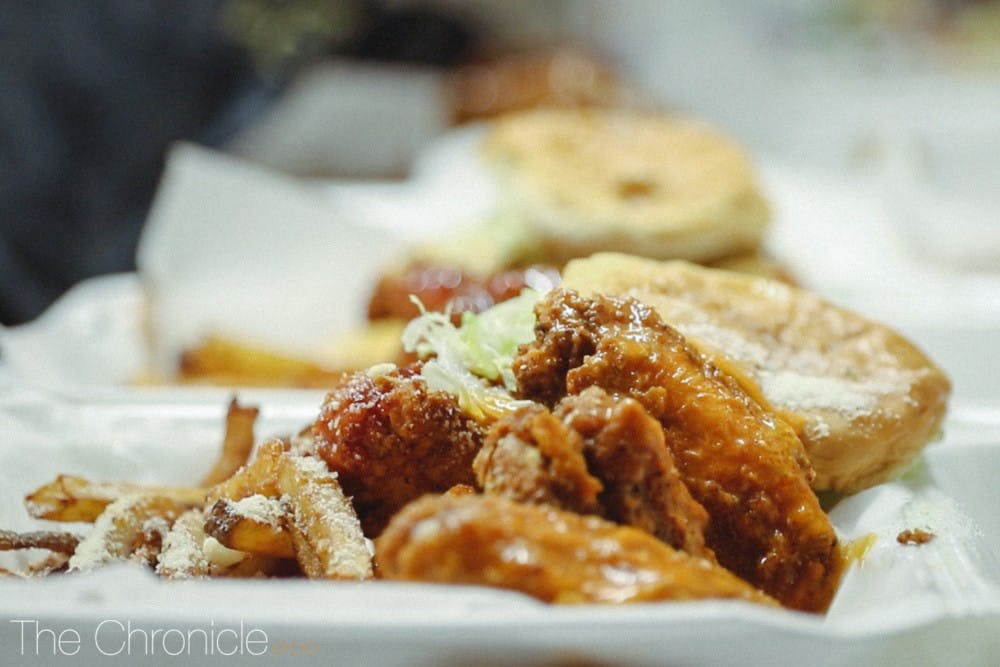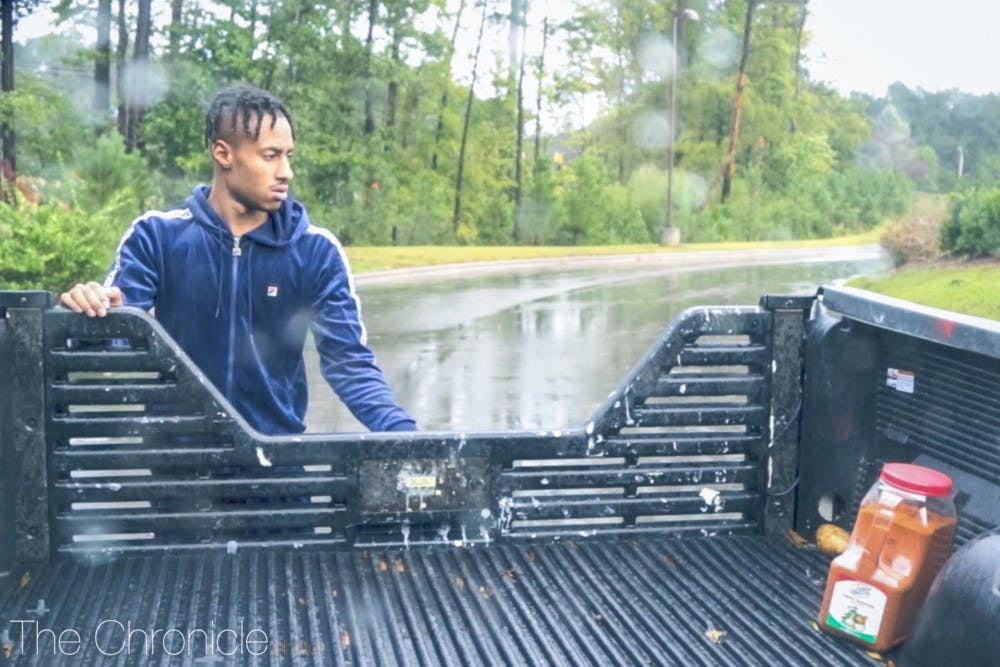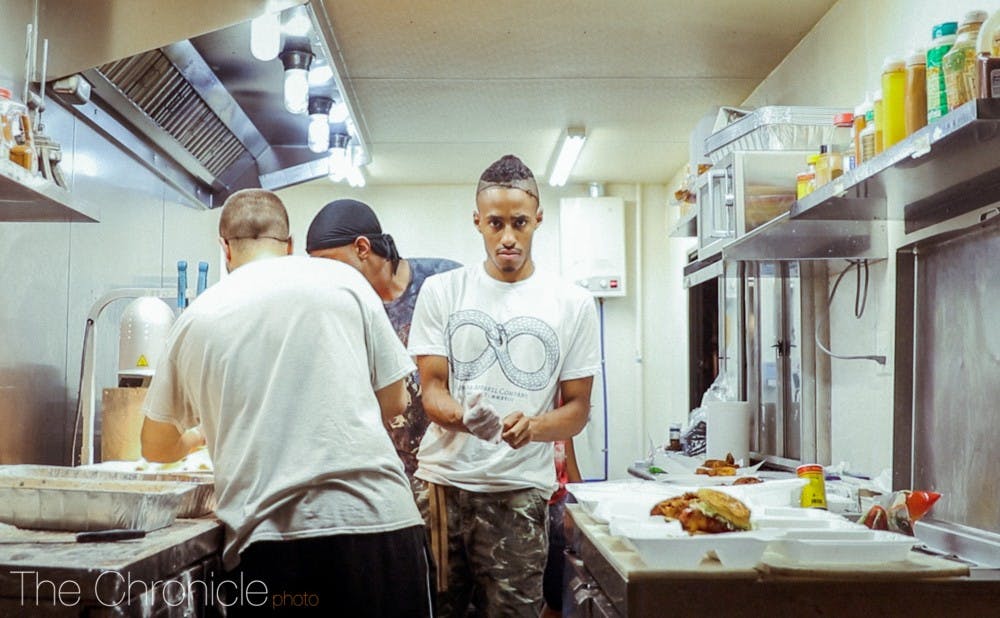A block down from Duke’s East Campus, a nondescript white food truck sits behind a bar. It’s nestled in the corner, almost hidden in a worn parking lot off of Main Street—and its owner is really, really excited about chicken tenders.
“I mean, you can’t beat a nicely breaded chicken tender,” says Ian Burris, owner of that food truck, the Dankery. “It has a good appearance, and when you bite into it, it’s just like, wow.” Burris pauses, then continues with reverent admiration. “I mean, the crunch and stuff, and the nice juicy on the inside.”
The Dankery and Burris are rising celebrities at Duke. Students who’ve had the food spread word about it like it’s gospel. Some plan their nights around ordering—if you don’t plan ahead, the Dankery might already be sold out.
On a Thursday night, Burris stands in the food truck’s doorway responding to orders on his phone. He has a hairnet on. Music blasts from a speaker at his feet. Two cooks bounce around the kitchen, moving chicken to griddle, fries to fryer, food to Styrofoam box. Delivery drivers come and go, picking up a set of boxes and peeling away. It’s half past midnight, and the Dankery’s chicken tenders are selling like hotcakes.

Burris does things differently
For starters, he doesn’t do daytime. The Dankery usually opens at 9 p.m. and closes at 3 a.m.
“I make it work for me,” says 22-year-old Burris. “I’ve never been a morning person. Like when I was in high school, I might’ve been on time 10 days out of the year.”
The business’s online presence isn’t standard either. Some restaurants are active on social media. The Dankery goes further. Burris runs the Dankery through Instagram. The menu is listed on the food truck’s page (@shrimpandpastasdankery), and customers send messages there to order. Using Instagram makes sense, Burris says, because his demographic—18 to 24-year-olds—is there.
The Dankery’s Instagram has over 11,000 followers. The page features highlights of Burris’ food, menus and instructions for ordering. The main draw, however, is Burris’ constantly updated Instagram story, where he updates fans on his day and offers inspiration to his followers with pictures and videos.
One day, Burris’ page advertised an event the Dankery co-hosted at Durty Bull Brewing Co. Then, between close-up videos of sauce-drenched chicken tenders set to bass-heavy rap, it offered a sneak peek of the new “Bull City steak-n-queso fries” Burris is developing. Next, it reminded customers that pick-up is preferred to delivery. The last picture showed off the haul from Burris’ latest grocery store run—several boxes of chicken tenders and a giant sack of potatoes.
Each ‘Dank tray’—the standard unit of the Dankery—comes with one entree item and fries. The menu features five entree items: Wings, chicken tenders, vegan tenders, tender sandwich and fried shrimp sandwich. It’s simple.
And then there’s the flavoring. Any entree can be customized with one of twenty-something rubs and sauces. Think Cookout milkshake menu meets chicken. Flavors range from classics like jerk and buffalo to the bold, like cheerwine barbecue and cinnamon chipotle dry rub. It’s all part of Burris’ vision.
“Some things are meant to be duplicated, like a buffalo sauce,” says Burris. “But I’ll be like, the buffalo sounds fire, let me mix ranch with it, or blue cheese.”
Everything is fried and covered in sauce. It looks like a doctor’s worst nightmare and everybody else’s best dream.

The business is unconventional. It’s popular, too.
With his staff of nine employees, Burris says he can cook and deliver about 80 trays a night. It’s an upgrade from a year ago, when he cooked in his parents’ garage before moving his kitchen into the food truck. It took him a while to save the money for the food truck—around $50,000.
But he can barely keep up with orders now.
Customers often order knowing they’ll wait an hour or two to get their food. That doesn’t stop them. Everyone wants a bite. Most of Burris’ business comes from North Carolina Central University and Duke, a rare connection between the two schools. Former Duke basketball players now in the NBA still order, Burris says. Durhamites get trays, too.
“Me coming from Durham,” he says, “that definitely brings the whole Bull City behind me.”
Even Durham mayor Steve Schewel is in on the Dankery. Schewel, whose son coached Burris in high school soccer and who has been in a book club with Burris’ father for decades, appeared on Burris’ Instagram a few weeks ago. He was ordering.
“I’m thrilled for Ian,” Schewel said. “I love the food. I mean, it’s just delicious.”
Burris keeps things moving at the food truck all night. He’s calm and effortlessly cool, content and happy, but not visibly excited. He claims he took 10 days off all of 2016 and gets in bed around 6 a.m. on a typical day.
“I put everything into it. I wake up and the move is re-ing up, or interviewing a new employee, or whatever it takes to keep the money coming in,” Burris said. “I knew immediately it wouldn't make me any money, but I knew one day it could.”
Re-up is Burris’ word for a grocery store run. He re-ups often; storage space is low and demand is high. A few days after spending the night at Burris’ food truck, I go with him on a re-up. I hop in the passenger seat of the new Ford he just bought. He’s proud of it, another sign of his success. He posted a picture of it on the Dankery’s Instagram a few weeks earlier. The speaker that filled his food truck with music is at my feet, still playing loudly. We drive to Restaurant Depot. There, Burris thinks about how he and the Dankery rose together.
'I kind of just had to blindly jump'
We walk through the restaurant superstore looking for tailless shrimp. They weren’t where they usually are, so Burris searches for them deep inside the freezer room. It’s cold. Burris, in a suede, navy Fila jumpsuit, is prepared.

As he cuts through aisles with purpose, Burris talks about his start in professional cooking. It came at Durham’s Riverside High School.
“In ninth grade, I would make cold cut sandwiches,” he says. “The school lunch was so trash that everyone wanted something else.”
There's a hint of regret in his voice when he says he sold the sandwiches for only $3.
Burris gets serious as he talks about school, where he feels like he couldn’t thrive as he can now.
“It was like, what am I going to have to live for?” Burris says. “Going to school, waking up and going to class, and then not doing well, that had me feeling real bad about myself.”
As he walks beneath tall shelves of assorted containers, Burris shares his next chapter. He played soccer at Cape Fear Community College, and he was on track to get a bachelor's degree in the spring of 2019. Then, he says that he had a falling out with a coach.
“I really don’t like to have a boss, and a coach is basically a boss,” he says. “I like to be my own boss.”
He withdrew from school and stayed in Wilmington. On late nights after games and parties, he started cooking for his friends.
“Everybody was hungry, nobody wanted to buy an $8 Uber to Cookout, and I was right there,” says Burris. “Might as well start cooking it up.”
Burris had grown up helping his mother cook. His friends loved his food and started constantly begging him to cook. He sensed an opportunity. He went to Bed Bath & Beyond and bought a fryer. Then he got to work.
Things weren’t great at first. He says he sold about one tray a night.
“I had to literally beg people to come try my food,” Burris says as he checks out. “My Instagram sat at 246 followers for a year. It was kind of discouraging because in my head I was like, ‘yo, this about to be so great.’ Then it was just dead and dormant for so long.”
He kept his head down, made some money and bought another fryer. This wasn’t his first business: After cold cuts, he mowed lawns. Later, he sold jerseys online—his first Instagram business.
Burris also ran what he calls a ‘dispensary.’ That startup got him in legal trouble, sending Burris to jail.
“It was definitely hard because I just felt rock bottom at that point,” Burris says. “Once I got slapped with the charges, getting a job was dead, so it was kind of like I was all in.”

He got serious about the Dankery, but not everyone shared his vision.
“I would go visit family and I would tell them that I’m about to go all in on the food, I’m never going back to school, and it would just scare everybody,” Burris says.
He did it anyway. Burris moved back to Durham and set up his kitchen in his parents’ garage.
He hasn’t let his foot off the gas since.
Burris and the Bull City
Burris almost never skips work, and tonight is no exception. The sun is starting to set. Opening time is getting closer. It rained earlier, and clouds still hang overhead.
“Tonight, business is probably gonna go crazy because of the storm,” Burris says.
We drive past downtown toward the food truck.
He sees himself as a bridge between historically divided Duke and Durham. He knows he’s young and hungry. He thinks Duke students identify with his ambition and respect him for his food. In the past, he recalls, Duke students would give him the cold shoulder at Durham bars upon realizing he wasn’t a student. But the Dankery wasn’t the Dankery then.
“Now the arms are more open,” he says. “So hopefully that same attitude that people have toward me now can go for the whole city. The one thing about good food is it can bring two people from completely different sides of the world together… I feel like it’s way bigger than anything I’ve got going on. The number of people I’ve been able to touch in a short amount of time, it’s not necessarily about me anymore. It could be way bigger.”
And he wants it to be bigger.
He's parked back by the food truck, and he’s trying to figure out how he can make opening earlier work. He’s experimenting with new food—lobster last week, cheesesteaks this week. He’s hunting for land he can build on in downtown Durham.
He has big dreams for the Dankery.
“Have I got to the level that I want to be on? No way,” says Burris. “No way. Not anywhere close.”
I ask him when he’ll be content.
“When the Dankery is in every college town in America,” he answers.
He stops and rethinks.
“It’ll feel like I made it when I open up the restaurant in Durham,” he decides.
Maybe he’ll do both. He has no intention of quitting any time soon.
“I done put so much into it already, there’s no going back,” he says. “It’s not like I’m ever going to stop at this point.”
The sun is gone. It’s almost 9 p.m.
Listen to our podcast with writer Jake Sheridan about the Dankery below.

